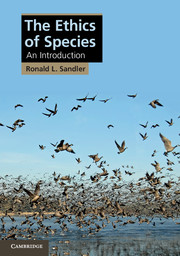Book contents
5 - Shifting goals and changing strategies
Published online by Cambridge University Press: 05 November 2012
Summary
I have argued that traditional species conservation approaches – that is, place-based preservation and ecological restoration – are undermined by global climate change, and that the emerging alternative – assisted colonization – is almost always unjustified. In this chapter, I develop a more positive account of how we ought to respond to the biodiversity losses expected to be associated with global climate change.
The first part of the chapter concerns adapting ecosystem management to conditions of rapid and uncertain ecological change. I argue that global climate change requires not only exploring new strategies to accomplish traditional ecosystem management goals, but also reconsidering the goals themselves and, in many cases, deemphasizing species preservation. I then discuss the implications of rapid and uncertain ecological change for the goals and strategies of ecosystem management in less impacted systems and highly impacted systems, respectively. The aim is to identify the values that are salient within each type of ecosystem, and indicate the sort of management goals and practices that they favor. The discussion is normative, not predictive. It is not meant to describe how ecosystem management and conservation biology will evolve in the future, but rather the values that ought to be considered in that evolution.
- Type
- Chapter
- Information
- The Ethics of SpeciesAn Introduction, pp. 100 - 129Publisher: Cambridge University PressPrint publication year: 2012



